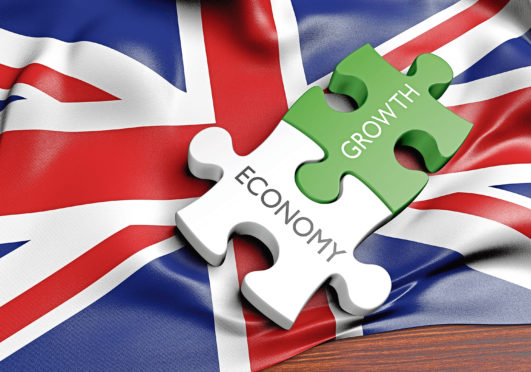Scotland will outperform the rest of the UK in economic growth terms this year – but 2020 is expected to deliver a measly 1% rise in gross domestic product (GDP) throughout Britain.
These are the predictions of global professional services giant PwC in its latest UK economic outlook.
PwC says economic growth in Scotland will remain subdued in 2019 and 2020, but slightly ahead of the UK overall this year.
The report anticipates growth of 1.3% in Scotland for this year, a fall of 0.3 percentage points from July’s projection, but ahead of the 1.2% expected across the UK.
In 2020, growth is projected to fall back to 1% north of the border, in line with the UK and significantly below Britain’s long-term average rate of around 2%.
PwC’s report also says UK GDP could be boosted by 4%, or £83 billion, if local areas with below-average productivity levels could make up even half of the gap.
Focusing on UK regional productivity, the report reveals wide variations in domestic productivity per job, as well as from an international perspective.
PwC concludes that UK output per worker is around 10-15% behind Germany, France and Sweden and more than 30% behind the US.
In terms of economic growth, only London and south-east England are expected to grow at a faster rate than Scotland this year, while in 2020 the ongoing economic uncertainty caused by Brexit is forecast to send growth down across all 12 nations and regions measured by PwC.
According to PwC, UK growth has slowed over the past two years primarily due to “a dampening of business investment, resulting from both a lack of clarity over Brexit as well as heightened global trade tensions”.
Although consumer spending has continued to drive the UK economy, supported by recent rises in real incomes, a cooling housing market coupled with slower jobs growth means there is likely to be only moderate UK-wide consumer spending growth of around 1.2% in 2019 and 1.4% in 2020, the report says.
Stewart Wilson, head of government and public sector for PwC in Scotland, said yesterday that political and economic uncertainties would continue to dictate the pace of GDP growth across Britain.
Mr Wilson added: “There could be a modest uplift in business investment should the UK finally secure an orderly Brexit.
“Even so, uncertainty across the global economy means growth is unlikely to return to previous levels next year.”
PwC chief economist John Hawksworth said: “Any potential weakness in private sector spending in 2020 should be offset at least in part by stronger trends in government spending.
“Both major political parties have shifted away from austerity, which is likely to support growth in 2020, irrespective of the outcome of the forthcoming general election.
“But this will also leave a bigger budget deficit to deal with in the longer term.”
